Cody C. Engdahl's Blog, page 6
June 2, 2024
Book Review of: Hawker and the King’s Jewel by Ethan Bale
Warning: You will immediately want to
read the next book upon finishing this one!
Hawker and the King’s Jewel is a rousing, action-packed adventure rooted in history, spanning from the battlefields of England to the streets of Venice.
Sir John Hawker is an aging knight tormented by dark secrets and his own sinful passions. His king, Richard III, gives him one last quest on the eve of the Battle of Bosworth Field: Return a cursed jewel to Venice and protect his bastard son.
But Richard’s attempt to undo the curse is too late. The king falls in battle, and now, Hawker and his band of unlikely friends must flee England and the Tudor/Lancastrian onslaught.
Their desperate flight will take them to Flanders and, ultimately, the Republic of Venice, where Hawker will have to navigate a maze of enemies and allies, all while not truly knowing which are which.
The characters are richly developed and fun to follow. Their motivations are believable even when they are not sure themselves. I have to say, my favorite was the oily Gaston Dieudonné. He will keep you guessing all the way to the end.
The plot is full of twists and turns, with a desperate nail-baiting climax full of surprises.
Bale gives an excellent sense of place, especially once we get to Venice. I’m almost certain he has walked those streets and has been inside the buildings and palaces he describes.
I really enjoyed his use of era-appropriate weapons. Hawker arms himself with a cinquedea to fight in the narrow streets of Venice. I first saw one of these at a traveling renaissance armor show at a museum in Nashville. The cinquedea is something between a dagger and a shortsword with an extraordinarily wide blade at the base. The name literally means “five fingers” because of its width. I was immediately fascinated when I first saw one. I was tickled to death when I saw one aptly used in this story along with elegantly light war hammers they hide in their cloaks, which are better for street brawls than battlefields.
I was drawn to this book when I heard the author on the Rock, Paper, Sword, Podcast. Ethan Bale is an instantly likable guy with a fascinating background in modern military journalism. But it was his description of the book that really got me.
I’ve been a fan of the War of the Roses history since I first read the Shakespeare plays. Probably because Shakespeare was pretty much a Tudor propagandist, I’ve always been biased towards the red rose of the Lancastrian side that eventually gave way to the Tudor dynasty. I’ve also been lulled into believing that Richard III was a hunchback murderous villain.
So it was interesting to see him in a different light and to see the heroes of this story dedicated to the Yorkist cause.
Bale even gives his own version of what happened with the missing princes in the tower, and a heroic and tragic conclusion to the Battle of Bosworth Field.
But those famous historical events are just the beginning of the adventure, not the end. There’s plenty more action and brushes with real history that follow.
After all of that, there’s a great setup for the next novel which will involve another one of history’s most notorious villains, or misunderstood heroes: Vlad the Impaler, better known in pop culture as “Dracula.”
I can’t wait!
Here’s a preview of the book:
Here’s a preview of my latest novel:
May 25, 2024
Hear me on the Rock, Paper, Swords Podcast!
Best selling authors Matthew Harffy and Steven A. McKay invited me on their podcast to talk about history, writing, publishing, marketing, and even a little about bourbon and fiddling!
Click below to listen!
Rock, Paper, Swords is a historical action and adventure podcast started by two of my favorite authors and good friends, Matthew Harffy and Steven A. McKay. They talk about everything to do with history, action and adventure, writing, and music too!
I’ve secretly wanted to get on the show since they announced it two years ago. But I was afraid to ask! They’ve had some really big guests like the great Bernard Cornwell, Griff Hosker, and Simon Scarrow.
So I was over the moon when they invited me! We had a great time! I hope you do too. You can listen to it anywhere you get your podcasts or click the link below to listen to it on their YouTube channel.
Make sure you give them a subscription. It’s a great show with a lot of interesting authors as guests.
You can also listen below on their YouTube channel
Sale alert!

Rampage on the River: The Battle for Island No. 10 is only 99¢
Through Thursday 5/30.
Check out 99¢ book here
May 5, 2024
Book Review of: Dark Frontier by Matthew Harffy
Matthew Harffy writes an absolute love letter to the American Western with all the charm of a newly unearthed Louis L’Amour classic.
There’s even a bit of Sir Arthur Conan Doyle in there to boot!
Dark Frontier is as much of a mystery novel and even a crime procedural as it is a Western. As smart as I like to think I am, I was totally surprised by the end, even though there had been clues all along.
Gabriel Stokes is a veteran of the Anglo-Afghan War and the crime-ridden streets of London, where he served as a detective. He has seen some things, man…horrible things, filling him with darkness and destroying his marriage with drugs and drink. When an invitation comes from an old army friend, Stokes thinks the wide-open skies of the American West will excise his demons. He soon finds out there’s plenty of darkness in the land of the setting sun.
Dark Frontiers has all the familiar elements you’d expect of a classic Western: stoic heroes, a beleaguered widow, the old whiskey-sodden gunslinger, and the powerful cattle baron who uses money and might to lord over a lawless land.
But Dark Frontier takes these beloved familiar pillars of our Saturday matinees and freshens them with unexpected twists and a new perspective. We see the familiar Old West through the eyes of an Englishman. Stokes is certainly a stranger in a strange land, but the dichotomy runs deeper than surfacy cultural differences.
Stokes brings the insistence of an ordered world in which justice and the rule of law prevail. His partner, Jeb White, is a utilitarian who’d rather deal out a reckoning from behind his smoking Remingtons. But as they point out their differences to each other, they’ll find they are more alike than different. They are merely the two sides of every man: Dr. Jekyll and Mr. Hyde, the gentleman and the savage, civilized man and the beast within.
I love fish-out-of-water stories. It’s what I like about Bernard Cornwell’s Sharpe Series, in which a low-born soldier becomes an officer, or Cornwell’s Saxon series (The Last Kingdom), where an English child is raised by Danes and then has to reconcile these warring cultures within him.
So I was fascinated when I heard that Cornwell’s fellow and rival sword-and-shield author, Matthew Harffy, was writing an American Western set in the late 19th century.
Harffy is well known for his Bernicia Chronicles, A Time For Swords series, and The Wolf of Wessex novel. These are well-loved classics in the British Dark Ages subgenre of historical fiction. So I was stunned when Harffy admitted on his Rock, Paper, Swords Podcast to fellow author cohost, Steven A. McKay, that he is a life-long fan of the American Western.
I mean, why not? I grew up in Detroit, making wooden swords and pretending to be a knight in shining armor. I can see my British cousins wearing cowboy hats and slinging capshooters at each other. So, I was delighted to see Harffy take on this labor of love.
Folks, I’m gonna tell you right now, you can feel that love in every word he writes. You’ll share that boyish wonder in every sentence you read. Harffy is a masterful writer. He would shine in any genre. Here, he paints such visual and lyrical landscapes, flesh and blood characters, and intense action scenes. Do yourself a favor: saddle up and ride off into the Dark Frontier!
Check out Dark Frontier here:
Check out my latest here:
May 3, 2024
2-Star Review!?
The book usually gets good reviews and is sitting at 4 stars on Amazon and Goodreads. But here’s a new one that has some legitimate critiques:
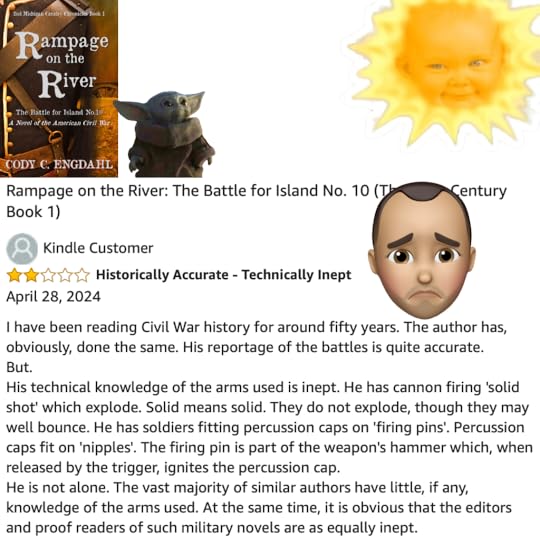
….but at least they said the battles were accurate…The unKind-le Customer is absolutely correct: Rookie mistakes for sure that I made on my first book five years ago. I certainly know better now. I fixed the firing pin/nipple thing. For the life of me, I cannot find where I had solid shot exploding. So if you know, point it out to me so I can fix it, please.
Of course, being an ego-manic, I can’t help but focus on the compliments. Every single critical review I’ve ever gotten for any of my books points out the accuracy of my battle depictions. One reviewer wrote, “Only the battlescenes are good” as the title of their review. Okay, I’ll take that.
This reviewer actually gives me too much credit. I haven’t quite spent fifty years reading Civil War history, but I’m working on it. I hope they give me another chance with The Perils of Perryville.
And if you’ve read any of my books, please give me as many stars
 as you think I deserve on Amazon and goodreads, and perhaps a few kind words. After all, we are made of stars.
as you think I deserve on Amazon and goodreads, and perhaps a few kind words. After all, we are made of stars. Here’s the book if you’d like to preview it.
May 1, 2024
Book Review of: Self-Publishing and Email Marketing by Bryan Cohen
Full title: Self-Publishing and Email Marketing: How to Create and Optimize a Reader Newsletter to Find New Fans, Gather More Reviews, and Sell More Books by Bryan Cohen
My rating: 5 of 5 stars
A practical and easy-to-understand springboard for any author wanting to dive into email marketing.
This is a hands-on manual that will teach you the fundamentals of email marketing and the things you didn’t know you didn’t know. It’ll even tell you the things you don’t want to hear but need to hear.
Cohen sets up the book in a very novel way. Each chapter is bookended with a conversation between himself and a fictional character, Nina, whom he is coaching. Nina is an amalgamation of the multitudes of authors he has taught. She is a proxy for the reader. In her resistance to his teaching, I found my own doubts and fears being addressed.
The chapters are laid out logically, taking you through the reasons you must have an email list, how to set one up, grow it, and how to use it for years to come as you build your writing and publishing empire. Each chapter ends with exercises to help put what you learned into action.
I would recommend this book for independent and commercially published authors alike.
This was not necessarily the book I was looking for, but certainly the one that I needed. The book I was looking for does not exist, nor can it. I wanted something that was going to take me, click-by-click, on how to technically set up an email list. The reason why that can’t exist is because technology changes so fast that any book that professed to offer that, would be obsolete in a week.
Cohen’s book certainly does help with that. He covers where you can go to get a domain name, a professional email server, and an email service provider. Even he admits that this is not easy in “Chapter Five: How to do I set up an email list without pulling out my hair?” in which he offers some practical advice on how to get through it.
I looked at a few books on email marketing for authors. I came down to this one and another one that is very popular and highly recommended. I went with Cohen’s because it was published more recently, and I had already known him to be a good teacher with good intentions through his 5-Day Author Ad Profit Challenge, which is FREE and I also recommend.
I trust him, and this book did not let me down. My email list is up and running as I write this. Please look me up and join if you like! https://subscribepage.io/EngdahlHouse I’m probably going to buy his book on Amazon Ads next.
View Cohen’s book here:
Check out my latest here:
April 8, 2024
I had a great time Saturday night at Rankin Rough & Ready’s SCV Camp 265!
Big thanks to Tim Cupit and Rankin Rough & Ready’s SCV Camp 265 for being so kind to me Saturday night. I know Tim was concerned that I drove over six hours from Nashville to perform my A Brief History of the American Civil War through Fiddle Tunes at your meeting. Well, sir, I can happily say it was well worth it! We had a great turnout!
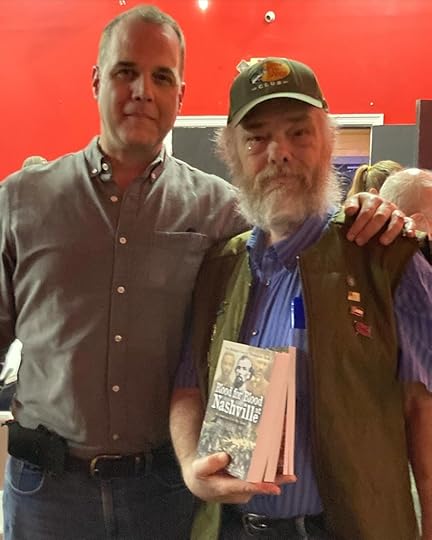
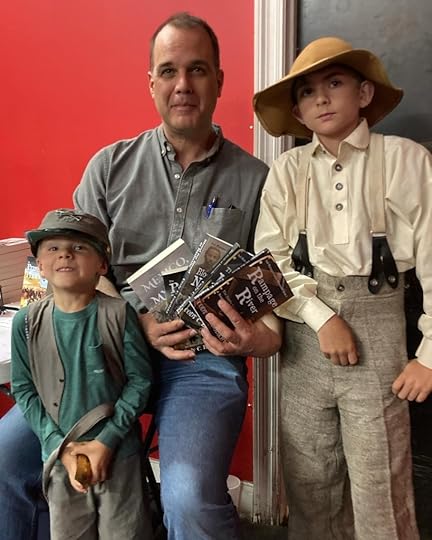

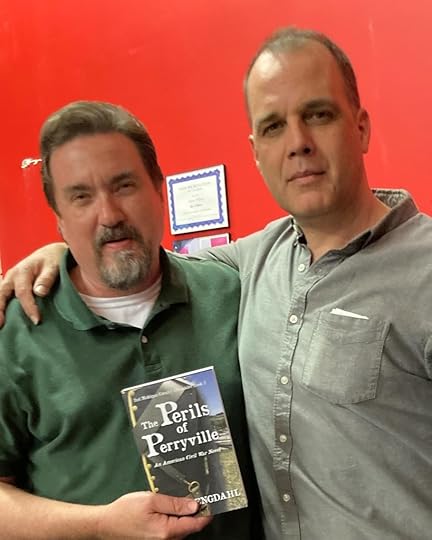



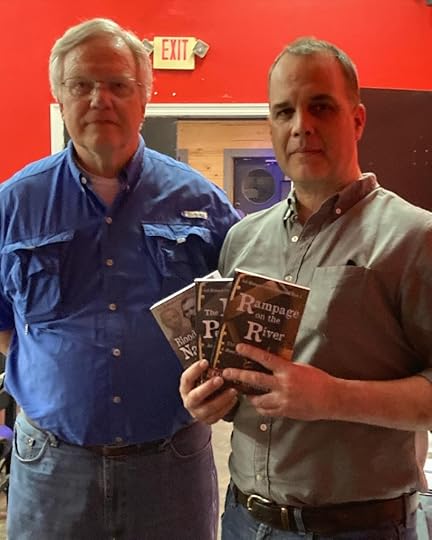

Everyone was really responsive and even laughed at some of my dumb jokes. I sold 21 books and got 7 new sign-ups for my email list. If anyone else would like to sign up you can send them here: https://subscribepage.io/EngdahlHouse.
I was also treated to some cold beer and a spicy hot crawfish feast. Thank you so much. Best of all, I got a book too! Thanks for the copy of From Here to Eternity. As a historical novelist, I am always reading other people’s work. From Here to Eternity is known to be a masterpiece and a classic. I’m sure I’ll learn a lot from reading it.

All in all, Saturday night was a perfect example of what I’ve come to know as Southern Hospitality and I am so grateful for it. Thank you everyone. Feel free to share this email with anyone who didn’t get a chance to sign up for my email list.
If anyone is interested in checking out my books, they’re all on Amazon. You can get them on Kindle, audio, and hardcover too. Here’s the link: https://mybook.to/TheLongCentury
Check out my latest novel:
March 31, 2024
My Review of: The Last Prince of the Mexican Empire by C.M. Mayo
My rating: 5 of 5 stars
The rare story hidden inside a rare story:
I stumbled onto this book while doing some research about the Second Mexican Empire. This book was billed as being historically accurate, so even though I ultimately used nonfiction sources for my project, I felt this novel would be entertaining and could add some texture to the time and place for me. Although the event I was specifically looking for was not covered in this book, I did feel like I got a lot of the backstory and texture I was looking for. Plus, I got a very interesting and true story that I had been unaware of.
This book centers around a child whom Emperor Maximilian and his wife Charlotte adopted to be their heir. The couple did not have any children of their own. The boy they adopted was the grandson of Mexico’s first failed Emperor, Agustín de Iturbide. This was in an attempt to endear themselves to the Mexican People. France had conquered Mexico and placed Maximillian, brother to Austrian Emperor Franz Joeseph, on the throne as a puppet ruler.
The story starts with Alice Green, a young, arrogant, and ambitious American girl who marries into the Iturbide family. They move to Mexico and get involved in the Imperial court. They agree to allow Maximillian and his wife to adopt their baby, but Alice soon regrets this and fights to get her child back.
I’ve read some of the critical reviews of this book and I do agree that Mayo’s jumping around multiple perspectives can be confusing. She also switches between present and past tense for reasons I cannot understand, but I didn’t mind this so much, knowing what this work is.
Looking at her other work, I can see she’s mostly a nonfiction writer. This may be her only novel, and it certainly doesn’t fit a lot of norms associated with long-form narrative writing. Unlike most novelists, Mayo lists her references and even explains much of her research at the end of this book. She says she wrote this as a novel because she wanted to get more into the heads of the characters to give emotional context to their actions and motives. What the characters are thinking, can only be speculative at best in a nonfiction format.
So, I give her a pass on this unorthodox storytelling. I got what I wanted, which was a richly textured look into 1860s Mexico with a lot of background information about Maximillian, his wife, General Bazaine, and all the other true historical characters in this story.
Thanks, Mrs. Mayo. I really enjoyed it.
Check it out here:
Check out my latest novel here:
View all my reviews
February 27, 2024
My Review of All the Light We Cannot See by Anthony Doerr
All the Light We Cannot See by Anthony Doerr
My rating: 5 of 5 stars
A tragic dance between childhood wonderment and the horrors of war.
After seeing this book dominate the top of all the charts I’m competing in, I had to read it. I’m happy I did. Even though I was left humbled and haunted.
The book is a binary story of two people and two timelines slowly intertwining and converging into an inevitable conclusion, both beautiful and heartbreaking.
The book starts in August 1944 as the Americans are preparing to bomb Saint-Malo on the Brittany coast. This timeline is the climax of the book. The second timeline begins in 1934. It tells the story of how the two protagonists are inexorably drawn to that same place and moment. The book ticks back and forth like the steady beat of a metronome through both characters’ stories and the two timelines until all the threads come together for the conclusion.
She is a freckle-faced blind French girl growing up in Paris. He is an albino, or at least I believe he is by his white hair, who is a German orphan growing up in a coal-mining town in western Germany. They’d both be considered oddities in the most normal of times. But during this time, they are now merely two of the millions of tragic characters in World War II. Both the children are infected with an intellectual curiosity that carries them through the horrors of war with a sense of hope and wonderment. The haunting refrain, “What you could be,” appears throughout the book.
The writing style is light and lyrical. The scenes are impressions, word paintings that convey texture and emotional context as the clues to the plot are revealed. Honestly, I found the style off-putting at first. The use of the present tense always seems gimmicky to me. The short Vonnegut-like segments were jarring and distracting at first. But this only lasted for the first few pages for me as I settled into the rhythm and tone of the book.
Pay attention to the little things along the way. They are threads that make up the fabric of this story. They are like radio waves bouncing off of buildings and growing bigger with echoes that sound throughout the book. The story tightens like the concentric turns of a nautilus, like the namesake of the submarine in the novel that the girl is reading throughout the story or the snail shells she collects. All these things are clues and themes woven into the narrative, historical, and fantastical structure of this book.
You should read it! I think you’ll like it.
Check out Anthony Doer’s book here
Check out my latest here:
February 17, 2024
The Broken Kingdom: Episode Three: Arthur’s Revenge by Angus Donald
My rating: 5 of 5 stars
A satisfying middle episode in of itself and a reason to keep reading.
I’m fascinated by this experiment in storytelling. This is Episode Three of what will be Book I of a trilogy. Book I will contain five episodes, so we are crossing the mid-point of the story here.
Before reading this, you must read the first two episodes to understand who’s who and what they’re doing as we pick them up here. If you have, you might want to go back and review those episodes since the episodes are coming out every month or so. Because I’ve read a few other books since the last episode, I had to go back and remind myself who was who and what was going on. Because of this, It would have been nice to have a “…previously on The Broken Kingdom” section like they do on a streaming service series. Perhaps a list of characters would help, too. Or maybe I could just be a bit smarter.
What’s interesting is that Donald is ultimately writing a novel with an overall story arc and pacing. Yet he still has to pull off individual episodes that are satisfying, have arcs of their own that include a climax, and compel the reader to come back for the next one. Episode Three does this well.
I won’t spoil anything here, especially for those who haven’t read the first two episodes. Episode Three picks up the story of several of the characters and follows them as they begin to converge. There’s an action-packed climax at the end, which may seem like a conclusion. However, Donald reminds us at the beginning of the episode that there is still a much larger threat looming in the distance. I’ll be interested to see how this threat presents itself and how the characters, both friends and foes, deal with it over the final two episodes.
If you haven’t read the first two episodes, you should. If you’re on the fence about this one, you definitely won’t be disappointed.
Check it out here:
Check out my latest novel here:
February 8, 2024
Review of The Sins of the Father by Annie Whitehead
The Sins of the Father by Annie Whitehead
My rating: 5 of 5 stars
Richly textured with detail only a medieval scholar could bring.
Sins of the Father should really be called Sins of the Fathers because it follows the children of both King Penda and King Oswii in the ongoing feud between these two royal families. Sins of the Father is the sequel to The Cometh Hour, however, I don’t think you need to read that book to understand this one, even though I recommend that you do because it’s also excellent.
Sins of the Father picks up a few years after the Battle of the Winwaed, where Penda was slain by Oswii’s forces. Penda’s eldest son takes back the Mercian throne and then reunites with his siblings, who’ve been cast asunder and have been living in hiding since the death of their father. The joy of reunion is short-lived as the old grudges between the families come back to haunt them.
Whitehead does a great job of painting seventh-century Britain with vivid details like clothing, customs, food, crafts, and medicine. She even gets the flora with the seasons right. I felt I could see, smell, touch, and taste the scenes. The Mercians, Northumbrians, and Welsh had different and unique cultures from each other. I liked that the main character was sensitive, self-conscious, and, at times, full of self-doubt. It made him seem real and relatable and not some “biggus dickus” with a sword. All the characters were well-fleshed out with understandable motivations.
In the end, this is a tale of how a feud between families can spiral into an endless cycle of tragedy that can last for generations. If you want to visit seventh-century Britain, Whitehead takes you there with a well-researched story of Britain’s last Pegan king and his legacy. Be sure to read the historical note at the end of the book, where she explains much of the real historical aspects of the story.
View all my reviews
Check out my latest novel here:



